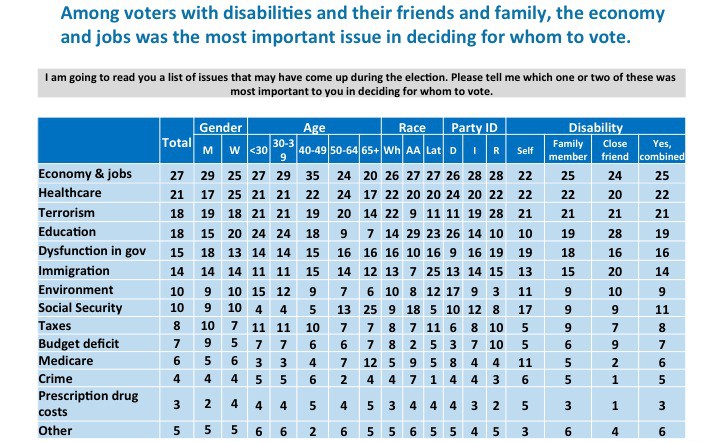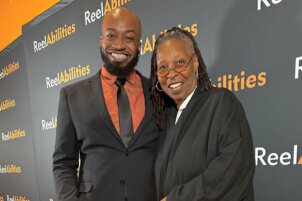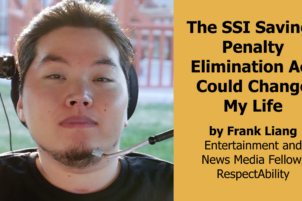Near unanimous bipartisan agreement that a candidate should treat people with disabilities with dignity and respect
View All Poll Data (PDF, Accessible PPT)
Washington, Dec. 14 – Two separate bipartisan polls showed results that may surprise Washington insiders: voters with disabilities and their family and friends voted in big numbers for President-elect Donald Trump. While polls showed that many voters felt Trump made fun of people with disabilities, he was seen as stronger on changing Washington and failed economic policies that hold people with disabilities back.
RespectAbility, a nonprofit, nonpartisan organization fighting stigmas and advancing opportunities for people with disabilities, commissioned questions on two different national polls.
In a bipartisan pre-election and election night survey conducted by Lake Research Partners and The Tarrance Group, voters with disabilities split their votes between President-elect Trump (46 percent) and Secretary Hillary Clinton (49 percent). On the same poll, voters with disabilities identified themselves as 41 percent Democrat, 21 percent Independent and 31 percent Republican, demonstrating that on Election Day more Independents with disabilities voted for Trump than Clinton.
In an earlier poll by Democratic pollster Stan Greenberg PhD of Greenberg Quinlan Rosner Research and Republican pollster Whit Ayres PhD of North Star Opinion Research from late October, more voters with disabilities (40 percent) supported Trump compared to voters with no connection to the disability community (36 percent). The survey also showed that people with disabilities were more likely to say that the country is on the “wrong track” (59 percent) than were those without any disability connection (54 percent).
The Clinton campaign, especially nearing the end of the cycle, had publicly shared a strong slate of issues to improve the lives of people with disabilities in America. However, the polling showed that those messages did not break through to voters. In a heated campaign that focused on a variety of issues, a majority of voters did not see or hear anything positive from Trump or Clinton about their policies or plans for people with disabilities. While voters were more likely to say they had heard from Clinton, still 60 percent did not hear anything positive while another eight percent responded they did not know. Clinton provided position papers on the advancement of people with disabilities and held a rally in Florida on these issues. While this was covered in print media, it did not make it into the television news cycle in a meaningful way.
Just 19 percent of voters reported seeing or hearing anything positive from Donald Trump about his policies, experience or plans for people with disabilities while 69 percent had not and 12 percent did not know.

The economy and jobs continued to dominate the election landscape. Nearly one-third of voters said the economy and jobs (27 percent) were the most important issues in deciding their vote. Healthcare, terrorism and national security, and education round out the top tier of concerns (21 percent, 18 percent, and 18 percent respectively), followed by dysfunction in government (15 percent) and immigration (14 percent). While voters with disabilities mirrored the electorate on many issues, they were more likely to care about dysfunction in government (19 percent vs. 15 percent), Social Security (17 percent vs. 10 percent) and Medicare (11 percent vs. six percent) when comparing with the general public.
Voters universally agreed (90 percent, 78 percent “very important”) that it is important that a candidate for elected office treats people with disabilities with dignity and respect. While overall numbers were strong across party lines, 94 percent of Clinton voters agreed that this value was “very important” compared to 61 percent of Trump voters.
“We are heartened that there is almost unanimous support for positive policies for Americans with disabilities,” said Jennifer Laszlo Mizrahi, president of RespectAbility, a nonprofit organization fighting stigmas and advancing opportunities for people with disabilities, who commissioned the two polls.
Voters with disabilities tend to be less educated and experience poverty at greater levels than other Americans. Indeed, only 1-in-3 working-age people with disabilities in America has a job.

The October poll of 900 likely 2016 voters also found overwhelming support for a series of policies to advance opportunities for people with disabilities. More than 8 out of 10 voters are more likely to support a candidate who prioritizes “ensuring that children with disabilities get the education and training they need to succeed;” 61 percent are much more likely to support the candidate.
Only 65 percent of youth with disabilities graduate high school, 19 percent less than students without disabilities, a White House study found earlier this month. Youth who do not graduate high school are more likely to be involved in the criminal justice system and have a more difficult time entering the workforce.
Similarly, 84 percent are more likely to support a candidate who prioritizes “expanding job opportunities for people with disabilities, so they can succeed just like anyone else;” 59 percent are much more likely to do so.
Only one in three working-age Americans with a disability has a job, despite the fact that studies show that 70 percent of the 21-million working-age people with disabilities are striving for work. More than 78 percent of non-disabled Americans are employed.
“Our nation was founded on the principle that anyone who works hard should be able to get ahead in life,” said Mizrahi. “People with disabilities deserve the opportunity to earn an income and achieve independence, just like anyone else. Companies including Amazon, Starbucks, Pepsi and others have shown that employees with disabilities are loyal, successful and help them make more money. If we find the right jobs for the right people, it can and does increase the bottom line of companies.”
On the issue of “ending rape and assault of children and adults with disabilities,” voters are 87 percent more likely to support a candidate who makes this issue a priority.
People with disabilities are twice as likely to be victims of crime than people without disabilities. People with disabilities between the ages of 12-15 and 35-49 were three times more likely to be victims of violent crimes.
Said Stan Greenberg, Ph.D., “This survey is a big lesson in how many people are affected by disabilities and how much it matters for elected officials to hear their very clear message. They too want politicians to do something about the risks they face and our founding principles: anyone who works hard should be able to get ahead in life. Ending rape and assault and expanding job and career opportunities matters for the partisans but most of all, for the undecided in this year’s congressional elections. They want to be heard.”
Likewise, Republican Whit Ayres commented, “We are accustomed to thinking about ‘soccer moms,’ ‘Hispanics’ or ‘values voters.’ But this poll shows that Americans with disabilities – and those who care deeply about them – are a demographic we need to pay attention to in the future.”
Strong majorities of likely voters also are more likely to support candidates who prioritize other policies to advance people with disabilities, including, “standing up against Hollywood bigotry and negative portrayals of people with disabilities (65 percent), ensuring that criminal justice reform specifically addresses the issues of the 750,000 people with disabilities incarcerated in America (58 percent), promoting positive media portrayals of people with disabilities in TV, Hollywood movies and books (58 percent).
In the October poll, more than half of voters report that they themselves have a disability (16 percent), have a family member with a disability (33 percent), and/or have a close friend with a disability (10 percent).
In the November poll, voters with a disability reported they are more likely to hold pro-life/anti-choice positions (47 percent) than the total voting public (41 percent).
“With the advent of wide-spread pre-natal testing, more and more genetic issues are being identified while parents have an option to terminate the pregnancy,” explained Mizrahi. “Research shows that when parents learn that they are carrying a fetus with Down Syndrome, 67 percent terminate the pregnancy. As a result, the population of people with Down Syndrome in America has shrunk by 30 percent over the past number of years. At the same time, there are many cases where people with disabilities are encouraged to commit suicide, as was glorified in the recent Hollywood movie ‘Me Before You.’ Issues around the value and dignity of lives of people with disabilities in America is of real importance to the disability community.”
Lake Research Partners and the Tarrance Group designed and administered their pre-election and election night omnibus survey, which was conducted in November by phone using professional interviewers. The survey reached a total of 2,400 likely voters nationwide. The sample consisted of 1401 interviews among voters who were reached on cell phones and 999 interviews among voters reached on landlines. Issue questions reached a total of 1,200 likely voters nationwide who voted in the 2016 elections (margin of error of +/-2.8%). The survey was conducted November 6 through November 8, 2016.
Telephone numbers were drawn from the Catalist voter file. The sample was stratified geographically based on the proportion of likely voters in each region. The data were weighted to reflect the aggregated presidential vote as reported in the 2016 exit polls, as well as by gender, age, race, party identification, education, marital status, union household and census region to reflect the actual proportions of the electorate. The survey has a margin of error of ±2.0% at the 95% confidence interval.
The October survey was conducted by Democratic polling firm Greenberg Quinlan Rosner and Republican polling firm North Star Opinion Research by phone of 900 likely 2016 voters from October 21 through October 24, 2016. Likely voters were determined based on stated intention of voting in 2016, and vote history in 2012 and 2014. Margin of error for the full sample is +/-3.27 percentage points at the 95 percent confidence level. Of the 900 respondents, 65 percent were interviewed via cell phone in order to accurately sample the American electorate.









Comments on this entry are closed.